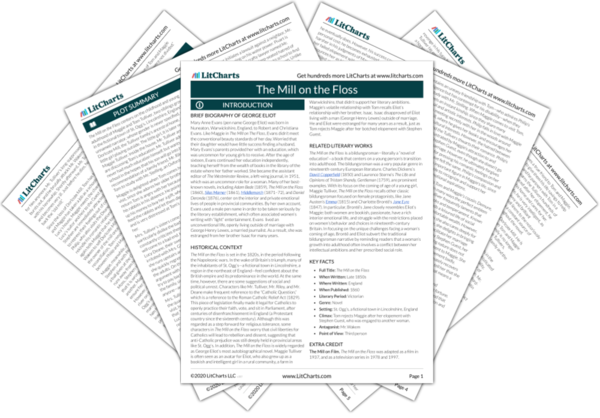Maggie’s dark hair symbolizes her rebelliousness against the standards of female dress, behavior, and appearance that dictate her life. From a young age, Maggie’s long, dark, and unruly hair marks her out as different from her mother’s side of the family, the Dodsons. Indeed, Mrs. Tulliver constantly laments that Maggie doesn’t have curly blonde hair, like her, Tom, and her Dodson sisters. In nineteenth-century Britain, blonde curls were idealized and associated with femininity, grace, and beauty. Maggie’s much-praised cousin Lucy Deane, for instance, has perfect blonde curls. In contrast, Maggie’s hair physically refuses to be bound up in the tight curls in which her mother tries to dress them, just as Maggie chafes against the restrictions placed on her gender. As a child, in a fit of anger, she cuts off her hair with scissors, symbolizing her desire to be free from those gendered requirements to be clean, neat, and pretty. The young Maggie even runs away for an evening to join a caravan of gypsies, convinced that she will find a home with people who have dark hair and dark coloring, just like her. That Maggie would run away from home for such a seemingly trivial reason suggests that she felt radically excluded and out of place as a child because of her hair. Her long dark hair is later regarded as beautiful by several of her admirers in adulthood, like Philip Wakem and Stephen Guest. Here, too, both men admire her hair because it makes her intriguingly different from other women. Whether praised or condemned, Maggie’s hair thus always symbolizes her unconventionality and reluctance to conform to the restrictive standards that govern women’s behavior and appearance in this period.
Maggie’s Hair Quotes in The Mill on the Floss
“But it isn’t for that, that I’m jealous for the dark women—not because I’m dark myself. It’s because I always care the most about the unhappy people: if the blond girl were forsaken, I should like her best. I always take the side of the rejected lover in the stories.”










